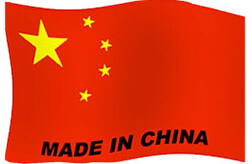This article was first published on August 9, 2010, on globalpost.com.
Earlier this summer, a company owned in part by the Chinese government bought a 5.1 percent stake in the only American-owned provider of enriched uranium for use in civilian nuclear reactors.
The stake is small, but its implications are considerable. The American company, USEC, was involved with the original development of the atomic bomb during World War II. Chinese involvement could raise concerns about national security in Washington, and given China's opaque form of economic management, the transaction raises other ethical issues around transparency and fairness.
In the long run, however, free market economies like the United States would best serve the cause of individual freedom worldwide by practicing what they preach. They should keep the global flow of money, ideas, and goods open.
As China's economy grows, its political influence will expand, bringing Beijing into ever-closer contact with the interests of others. As the world's largest exporter, for example, China will find itself in competition (and sometimes conflict) with a diverse set of multinational companies and governments. Within China, there will be more clashes involving the collision of local rules with foreigners and their business models.
Beijing continues to welcome foreign investment, but recent labor disputes at a Honda Motor factory and a spate of suicides involving workers at Foxconn, a Taiwanese-invested Chinese company that manufactures the Apple iPhone, underline the clash of political and commercial cultures. Sometimes these confrontations produce compromise or even a convergence of standards. At other times, open conflict is the likelier scenario.
China is the world's leading practitioner of state capitalism, a system in which governments use state-owned companies and investment vehicles to dominate market activity. The primary difference between this form of capitalism and the Western, more market-driven variety, is that decisions on how assets should be valued and resources allocated are made by political officials (not market forces) with political goals in mind.
In China, robust growth is a good thing, as long as it doesn't have second-order effects that undermine the leadership's monopoly hold on political power. Russia, Saudi Arabia, Venezuela, and other governments practice various forms of this system, but China gives state capitalism its global significance.
The political agenda behind China's state capitalist development is a complicated one. On the one hand, the financial crisis and global market meltdown have bolstered the arguments of those within the Chinese leadership who warn that reliance for economic growth on exports to Europe, America, and Japan exposes China to Western market volatility. In response, Beijing will gradually work to increase domestic demand for Chinese products and to reduce the country's dependence on foreign consumers. On the other hand, the leadership knows that Chinese companies must adopt Western working standards and management techniques if labor unrest is to be contained.
The cases of Honda and Foxconn, which employs some 800,000 people in China, underline a remarkable trend: Chinese workers are demanding and receiving better working conditions and wages. For example, the Guangdong Provincial People's Congress may give workers the officially sanctioned right to strike. This marks a positive development in the interaction of state capitalist and market-driven economics, but continued progress won't come easy. The Chinese leadership will respect labor rights when necessary and ignore them when possible.
The financial crisis and BP's oil spill remind us that excessive focus on near-term profits continue to plague market-driven capitalism. Yet, state capitalism poses profound ethical challenges of its own.
First, when state-owned companies go abroad in search of new contracts, they are not bound by shareholder opinion or reputational risk. As a result, they can do business in places and with people that their private-sector rivals cannot—and with a high degree of secrecy.
There are familiar examples like Iran, Sudan, and Myanmar. In Guinea last year, just 15 days after soldiers shot down 157 pro-democracy demonstrators, an unnamed Chinese company signed a $7 billion mining contract with the Guinean government. Multinational companies can no longer afford such transactions.
In addition, within free market democracies, courts exist to safeguard the rights of individuals and companies. In state capitalist countries, they exist to legitimize the state's hold on political power. As a result, when the White House pressures BP to pay damages, the company knows it will have its day in court. In China, a foreign company is unlikely to win a ruling against the government. In the United States, companies "lawyer up." In China, they are "Googled out."
Take Google, for example. When Google executives decided that cyber-attacks on its Gmail accounts from inside China could no longer be tolerated, they decided on open confrontation with China's government over censorship issues. Google remains a relatively popular brand with Chinese internet users, but there were several reasons why Beijing would rather force Google out than compromise with it.
First, there are other search engine firms that do not challenge the leadership's right to restrict the flow of information. Second, one of those firms is Baidu, a Chinese company with friends in government and a much larger Chinese market share than Google. The message sent to Google was clear: Lawyer up if you want to, but you have started a war you cannot win.
The clash of market-driven and state-driven capitalism poses other questions. Should U.S. lawmakers allow a company or investment fund owned by a foreign government to own significant stakes in a U.S. financial firm or oil company?
On the one hand, the political firestorm that erupted in Washington when China National Offshore Oil Corporation tried to buy U.S.-owned Unocal in 2005 generated plenty of friction in U.S.-Chinese relations and did lasting damage to America's reputation as a destination for foreign investment.
Yet, there are good reasons to scrutinize these kinds of proposals. State-owned companies and sovereign wealth funds based in authoritarian countries are often as opaque as their governments. Is it not reasonable to wonder how such a company or fund will manage its new assets before approving a sale with potential security implications?
On the other hand, if relatively free market countries are to compete successfully with state capitalist systems, it won't be by trying to beat them at their own protectionist game.
The unprecedented cross-border flows of ideas, information, people, money, goods, and services have already done a lot of good for a lot of people. If allowed to develop further, they will eventually open state capitalist systems to a degree of free market competition that will force them to change.
Not all trades are good ones. Some foreign investment might legitimately compromise U.S. national security. But if the goal is to shift power and wealth from authoritarian governments into the hands of private citizens, the game must be played on free market terms.





